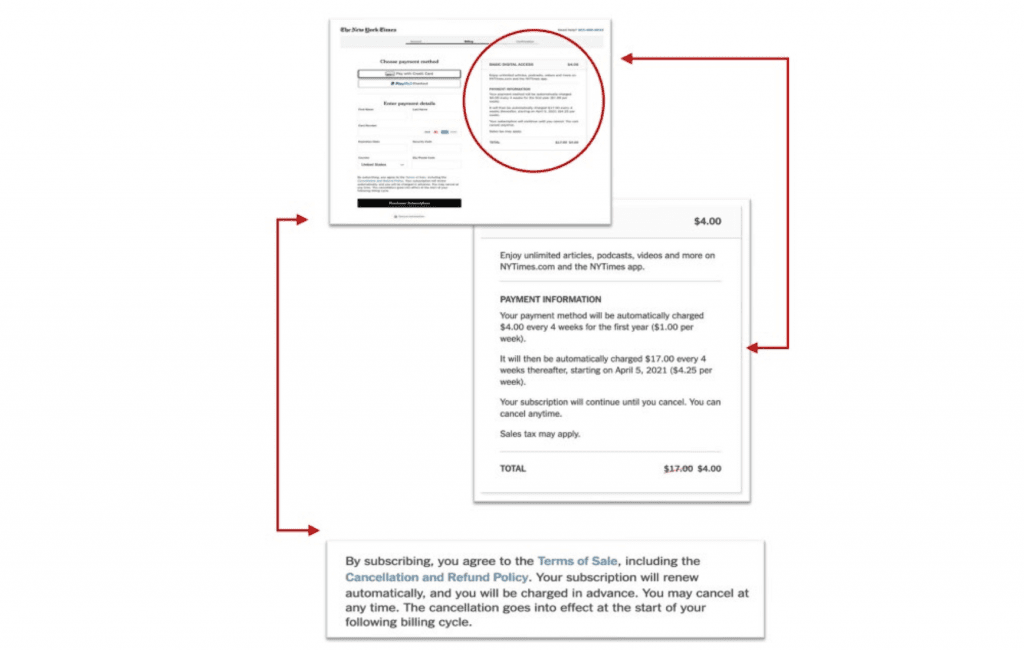The New York Times has been handed a mixed result in its bid to escape the bulk of a lawsuit accusing it of failing to adequately disclose its subscription-renewal terms to consumers in violation of North Carolina’s Automatic Renewal Statute. Plaintiff Megan Perkins filed suit against the New York Times in a New York federal court in June 2022, in which she alleged that the newspaper “automatically renewed her subscription 23 times [without her knowledge and consent], resulting in unauthorized charges totaling $136.” The Times sought to get the putative class action tossed out, arguing that, among other things, it made clear and conspicuous disclosure of its renewal policy.
For some background: Perkins – who purchased a monthly digital subscription through the Times’s website in February 2020 – alleges that the Times did not “clearly and conspicuously state that her subscription would automatically renew every month until she cancelled,” and that news company did not “describe the full cancellation policy that applied to her purchase.” Moreover, Perkins claims that the Times did not provide her with timely notice of the fact that in Feb. 2021, a year after her subscription began, her monthly subscriber fee would double from $4 to $8.
Specifically, Perkins states in furt lawsuit that the Times checkout page does not comply with North Carolina’s Automatic Renewal Statute (“ARS”) because it fails to: (1) display in bold, 12-point type the change to her subscription upon automatic renewal; (2) enable consumers to access the details of its cancellation policy until they complete the checkout process and agree to subscribe (“The subscriber checkout page advises the consumer that a subscription may be canceled at any time but does not explain how to do so,” per Perkins); and (3) “provide written notice for any automatic renewal exceeding 60 days.” As such, Perkins – who says that she was residing in North Carolina when she first purchased the subscription – alleges that the Times violates all four subsections of the ARS.
The key subsections of the ARS include …
– s. (41)(a)(1), which requires the seller to “[d]isclose the automatic renewal clause clearly and conspicuously in the contract or contract offer.”
– s. 41(a)(2), which requires the seller to “[d]isclose clearly and conspicuously how to cancel the contract in the initial contract, contract offer, or with delivery of products or services.”
– s. 41(a)(3), which mandates that for “any automatic renewal exceeding 60 days” the seller must give written notice “stating the date on which the contract is scheduled to automatically renew and notifying the consumer that the contract will automatically renew unless it is cancelled by the consumer prior to that date.”
– s. 41(a)(4), which states that “if the terms of the contract will change upon the automatic renewal of the contract, disclose the changing terms of the contract clearly and conspicuously on the notification in at least 12-point type and in bold print.”
The ARS Claims
Delving into Perkins’ claims, Judge Kevin Castel of the U.S. District Court for the Southern District of New York primarily sided with the Times in terms of ARS subsection 75-41(a)(1), finding that the Times’s subscription-checkout page “contains a few short paragraphs of plainly visible text, and it twice advises that a subscription will automatically renew until it is canceled, including once above the checkout button.” The complaint does not plausibly allege how “the automatic-renewal provision was not clearly and conspicuously presented [or] why its terms would not be obvious or plainly visible to a consumer,” according to the court, which granted the Times’s motion to dismiss Perkins’s claim under subsection 41(a)(1) as a result.

In terms of subsection 41(a)(2), the court refused to toss out Perkins’ claim, determining that the complaint plausibly alleges that the Times did not clearly and conspicuously disclose how to cancel a subscription in a manner required by the ARS. The court was not persuaded by the Times’s arguments that its inclusion of a “bolded, blue hyperlink to the Cancellation and Refund Policy” is a clear and conspicuous disclosure, namely since the link sends consumers to “a multi-paragraph explanation that lists a cancellation phone number in the second paragraph and also states that cancellation is available through online chat.” The court noted that based on the Times’s submission, “the methods for cancellation are not highlighted and do not stand out from the dense, surrounding text.”
The court swiftly did away with Perkins’ claim under subsection 41(a)(3), noting that in her opposition brief, Perkins acknowledges that the subsection is inapplicable to her subscription, and thus, it is deemed voluntarily dismissed.
Finally, the Times argues that since subsections (a)(3) and (a)(4) were added to the ARS as part of a 2016 amendment, they should be applied in tandem. As such, the newspaper contends that since Perkins does not allege an automatic renewal that exceeds 60 days under subsection (a)(3), her s. 41(a)(4) claim should be dismissed. Siding with Perkins, the court held that the Times’s construction of s. (a)(4) “lacks support in the statutory text,” as the two subsections are presented as “different and independent subsections of the ARS.” With that in mind, Judge Castel found that Perkins plausibly alleges that the Times’s checkout page does not satisfy the requirements of subsection (a)(4) – and thus, refused to dismiss the claim – because the sentence describing the subscription price increase is not bolded and in 12-point type.
On this same point, the Times argued that the statute’s requirement of a 12-point type is “difficult to apply as to a website because a consumer using a phone or desktop browser generally tailors on-screen text size to a personal preference, as opposed to printed materials, where a publisher alone controls the type size and style.” Punting that issue for a later stage, the court held that at this time, it “need not decide how the 12-point type requirement of section (a)(4) applies to a digital platform because, at the very least, the text was not offset in bold type, as the statute requires.”
Standing, Unfair Trade Practices & Unjust Enrichment
Despite allowing half of Perkins’ ARS claims to go forward, Judge Castel “noted sua sponte that beyond the pleading stage, for Article III standing purposes [Perkins will] need to show not just that she suffered a concrete harm in the form of auto-subscription payments, but that it was the Times’s non-compliance with the remaining claims under the ARS that caused her harm,” Covington & Burlington’s Samuel Greeley and Kathryn Cahoy stated in a note.
As for her Perkins’ other claims, the court dismissed her claim under North Carolina’s unfair and deceptive trade practices law, finding that she failed to establish that the Times’s alleged lack of conspicuous disclosures amount to “egregious or inequitable conduct” required by statute. And finally, the court tossed out her unjust enrichment claim on the basis that it was already governed by the parties’ subscription contract.
THE BIGGER PICTURE: North Carolina’s ARS statute has been in place since 2007 and amended in 2016, “neither the parties nor the court were able to locate any decisions interpreting [it],” per Greeley and Cahoy, making this a case of first impression. “The court noted that while California had a heavily litigated automatic renewal statute, Cal. Bus. & Prof. Code § 17602, its provisions materially differed from North Carolina’s ARS and did not provide guidance as to how ‘clearly and conspicuously’ – an undefined term [under the ARS] – should be interpreted.”
The lawsuit at hand comes as legislators and regulators continue to pay increasing attention to the automatic renewal space. This spring, for instance, the Federal Trade Commission proposed a rule that could impose detailed transparency, consent, simple cancellation, and annual reminder requirements on companies that use any medium to offer recurring subscriptions for products or services and could enable the agency to seek civil penalties of $50,000 or more per violation. If passed, Baker McKenzie attorneys stated in a note that the proposed Negative Option Rule “would also sit on top of existing statutes and regulations at the state and federal level governing recurring subscriptions, adding to the onerous requirements that already apply to sellers of subscription plans.”
The case is Perkins v. The New York Times Co., 1:22-cv-05202 (SDNY).











